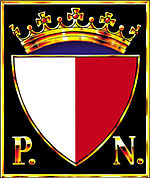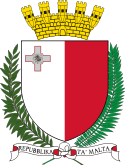- Nationalist Party (Malta)
-
Nationalist Party
Partit Nazzjonalista
Leader Lawrence Gonzi Founded 1880 reorganised 1926 Headquarters Id-Dar Ċentrali
Triq Herbert Ganado
PietàYouth wing Nationalist Party Youth Movement Ideology Christian democracy,
Liberal conservatism,
Conservatism,
Pro-Europeanism,
and historically pro-ItalianPolitical position Centre-right International affiliation International Democrat Union European affiliation European People's Party European Parliament Group European People's Party Official colours Blue House of Representatives 35 / 69European Parliament 2 / 6Website www.pn.org.mt Politics of Malta
Political parties
ElectionsMalta 
This article is part of the series:
Politics and government of
MaltaRepublicSubdivisionsForeign policy
The Nationalist Party (PN, Maltese: Partit Nazzjonalista) is one of two major contemporary political parties in Malta, along with the Labour Party. It was founded by Fortunato Mizzi in 1880 as the Anti-Reform Party, opposing taxation decreed by the British colonial authorities and measures to Anglicise the educational and the judicial systems. The presence of Italian refugees from the Risorgimento gave the party a liberal constitutionalist character (which caused friction between Mizzi and the Church in the Party's early days) and a pro-Italian stance which lasted until the Second World War.
Contents
Party structure
The Party structures are the General, Executive and Administrative Councils, the Parliamentary Group, the District Fora and Sectional Committees, the College of Local Councillors and a number of Party branches.[1]
Party officials include the Leader, Deputy Leader, Secretary-General, Presidents of the Party's three councils, Treasurer, International Secretary, Secretary of the Parliamentary Group, Deputy Secretary-General and President of the College of Local Councillors.
The General Council is made up of delegates and representatives from the other Party structure, the largest number being delegates elected by the Sectional Committees. The General Council elects and approves the Party Leader and Deputy Leader, approves the electoral programme, approves the Secretary-General's report on the state of the Party and amends the Party Statute. The Executive Council is made up of the Party's highest officials, representatives of the General Council, Parliamentary Groups, Sectional Committees and the Party branches and MEPs. The Executive Committee is the political and policy making body of the Party and, amongst other things, elects most of the Party officials, approves candidates, drafts the electoral programme and lays out the broad policy guidelines. The Administrative Council is made up of Party officials and deals with Party organisation.
The Party is organised geographically in Sectional Committees which are then organised in District Fora with special special provisions applying for Party organisation in Gozo. The Parliamentary Group and the College of Local Councillors bring together the Party's elected representatives in parliament and local councils. The Party's branches include youth, women's, seniors', workers' and entrapreneurs' sections.
Although not part of the Party structure, the Party owns a number of companies including a media company, Media.Link Communications. This company runs NET Television and Radio 101 which broadcast free-to-air nationally, newspapers in Maltese (In-Nazzjon and Il-Mument), a media library and the online news portal Maltarightnow.
History
In its early years the party was divided between abstentionists and anti-abstentionists. The abstentionists would immediately resign their post in the Council of Government immediately upon election as a protest against the token representation of the electorate on the Council; the anti-abstentionists favoured co-operation with the colonial authorities in order to work for a better constitution.
Following the First World War a broader and more moderate coalition, the Maltese Political Union (UPM), was formed but a more radical and pro-Italian group, the Democratic Nationalist Party (PDN), split from the main party. The two groups contested the first legislative elections of 1921 but in separate constituencies so as not to damage each other's chances. However, after elections the UPM, which emerged as the largest Party in the Legislative Assembly, chose Labour as its coalition partner.
The parties again contested the 1924 elections separately although this time they did form a coalition, eventually merging in 1926 under the old name of Nationalist Party. It lost its first elections as a re-unified Party in 1927 to the "Compact", an electoral alliance between the Constitutional Party and Labour.
A constitutional crisis, resulting from a dispute between the Church and the Constitutional Party, meant that elections were suspended in 1930. They were held again in 1932 when the Nationalists emerged victorious (21 seats out of 32). However, the Nationalists did not last long in government. The colonial authorities, concerned at the rise of fascist Italy in the Mediterranean and Africa, suspended the government and the constitution on the pretext that government's measures to strengthen instruction of Italian in schools violated the Constitution.
The Nationalists received what could have been their coup de grâce during the War. Their association with Italy, the wartime enemy, antagonised them with the electorate and their leader, Enrico Mizzi (son of Fortunato) was first interned and then exiled to Uganda during the War along with other supporters of the Party. The Party did not even contest the 1945 elections for the Council of Government which for the first time raised the Labour Party from third-party status to that of a major party at the expense of the Constitutionals.
Notwithstanding, the Nationalist Party survived and in its first major electoral test, the legislative elections of 1947, it managed to stay ahead of various splinters that had formed from people who did not want to be associated with the main party. In the following 1950 elections, a very damaging split occurred in the ranks of the governing Labour Party resulting in two parties: the Malta Labour Party (MLP) and the Malta Workers' Party (MWP). This helped the Nationalists become the largest party in the Legislative Assembly and form a minority government which, though short-lived, re-established the Nationalist Party as a major political party. Enrico Mizzi was sworn in as Prime Minister, but died after three months in December.
Two subsequent elections were held in 1951 and 1953 where the Nationalists formed short-lived coalitions with the Malta Workers Party (which, over the years, eventually disintegrated). The Party lost the 1955 elections to Labour and the following years it led the campaign against the Labour Government's proposal for Integration with Britain. Integration failed largely because Britain lost interest after the Suez fiasco and the constitution was again revoked in 1958 following massive disturbances over redundancies at the Malta Drydocks.
A new constitution was enacted in 1961. The Nationalists, led by George Borg Olivier won the 1962 elections, fought largely over the issue of independence and having as a backdrop a second politico-religious crisis this time between the Church and the Labour Party. Independence was achieved in 1964 and the Party was returned to office in elections in 1966. It lost the 1971 elections by a narrow margin and lost again in 1976.
In the elections of 1981 the party, now led by Eddie Fenech Adami achieved an absolute majority of votes for the first time since 1933 but it did not gain a parliamentary majority and so remained in the opposition. A crisis followed with the party MPs refusing to take their seats. Amendments to the constitution in 1987 meant that the party was voted into office that same year.
In 1990 the government formally applied to join the European Community. A wide-raging programme of liberalisation and public investments meant the return to office with a larger majority in 1992. However, the party was defeated in the 1996 elections. The stint in opposition would last only 22 months as the government soon lost its one-seat majority. The party won the 1998 elections convincingly, a feat that was repeated in 2003 following the conclusions of accession negotiations with the European Union in 2002. Malta joined the European Union in 2004. The Nationalist Party won narrowly the general elections in 2008.
Since Independence in 1964, the Nationalist Party has democratically won the absolute majority of votes cast in five out of ten general elections, in 1981 (despite which they did not obtain a parliamentary majority), 1987, 1992, 1998 and 2003. In 1966[2] and 2008 it won with a relative majority.
Today
The party presently holds 35 seats in the 69 member House of Representatives.
It is a member of the European People's Party (EPP) and it returned its two incumbent MEPs, Simon Busuttil and David Casa, in the European Parliament election held in June 2009. Casa and Busuttil will sit with the EPP Group.
The party is led by Lawrence Gonzi, who was elected Leader on 3 March 2004. He was confirmed Leader of the Party on 11 May 2008, after his victory at the polls held on the 8th March.
During the first years of the 21st century, the Nationalist Party embarked on a project to rebuild its headquarters in Pietà. This project was realized on 21 June 2008, when it was inaugurated by Lawrence Gonzi.
Leaders
- 1880-1905 Fortunato Mizzi
- 1926-1942 Sir Ugo Pasquale Mifsud (Prime Minister: 1924-27, 1932–33) and Enrico Mizzi
- 1942-1944 Giorgio Borg Olivier (acting)
- 1944-1950 Enrico Mizzi (Prime Minister: 1950)
- 1950-1977 Giorgio Borg Olivier (Prime Minister: 1950-1955, 1962–1971)
- 1977-2004 Eddie Fenech Adami (Prime Minister: 1987-1996, 1998–2004)
- 2004- Lawrence Gonzi (Prime Minister: 2004-2008, 2008-)
References
External links
 Malta topics
Malta topicsHistory Politics Constitution · President · Prime Minister · House of Representatives · Political parties (Nationalist • Labour • Green party • Imperium Europa) · Foreign relations · Elections · Local councils · Armed Forces · LGBT rightsGeography Economy Culture People Demographics · List of people
Populations abroad: Australia · Belgium · Brazil · Gibraltar · UK · USALanguages Symbols
Education,
and HealthcareUniversities (Student Associations) · HospitalsCommunications Categories:- Catholic political parties
- Christian democratic parties
- Political parties in Malta
- Political parties established in 1880
- International Democrat Union member parties
Wikimedia Foundation. 2010.
